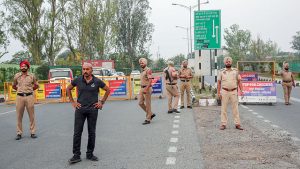India-Pakistan Tensions May 2025 Spark Unprecedented State-Level Emergency Actions
The India-Pakistan tensions in May 2025 have led to a series of unprecedented emergency responses by Indian states. Following a deadly terror attack in Jammu and Kashmir’s Pahalgam on April 22, which killed 26 civilians, India launched airstrikes targeting terror bases in Pakistan and Pakistan-occupied Kashmir. The retaliatory strike has since escalated into a tense standoff. In preparation for any fallout, Indian border states have implemented critical safety measures, including school closures, restricted civilian movement, and the cancellation of all police and administrative leave.
These urgent actions are not merely precautionary—they represent coordinated risk mitigation across sensitive regions that share porous international borders. Border states are now on alert for possible infiltration attempts, retaliatory attacks, or disruptions to civilian life as geopolitical tensions continue to rise.
Also Read : Pakistan Targets Jammu Airport with Drone Attack, India Responds Swiftly
Punjab Intensifies Border Security, Closes Schools, and Cancels All Government Leaves to Brace for Fallout
Punjab, which shares a 532-kilometer international border with Pakistan, has taken some of the most rigorous steps in response to the India-Pakistan tensions May 2025. Authorities have issued a complete shutdown of schools in all districts located near the border, including Ferozepur, Amritsar, and Gurdaspur. This is being done to ensure that children and educators remain safe in case of any cross-border incidents.
The state government has also ordered a complete blackout in vulnerable areas to prevent visibility from the Pakistani side, especially during nighttime hours. Police forces, paramilitary units, and local administrative staff have had their leaves suspended indefinitely. Security checkpoints have been increased, and surveillance has been intensified using drones and thermal sensors.


Haryana Steps Up Border Vigilance and Shuts Educational Institutions in High-Risk Areas
Haryana, although not sharing a long border with Pakistan like Punjab or Rajasthan, remains a strategic support state. Authorities in the state have closed down educational institutions and deployed extra police and intelligence units to sensitive locations. Particularly in areas near the Ambala cantonment and border-adjacent regions of Sirsa and Fatehabad, high alert has been sounded.
All personnel involved in emergency and internal security operations have been ordered to report back to duty. These actions are meant to not only assist neighboring Punjab but to ensure there is no internal disruption or sabotage within Haryana during this period of heightened tensions.
Rajasthan Enforces Night Curfews, Boosts Surveillance, and Prepares Border Districts for Emergency Scenarios
With a 1,070-kilometer-long international border shared with Pakistan, Rajasthan has been placed under a state of heightened readiness. Border districts like Barmer, Jaisalmer, Bikaner, and Sri Ganganagar are on 24-hour watch. Night curfews have been enforced in these regions to control civilian movement and reduce vulnerability to possible shelling or drone surveillance.
The state’s Home Department has instructed local administrations to activate emergency shelters and ration supply chains. Satellite phones and wireless networks have been issued to key officials to ensure uninterrupted communication during any potential crisis. Additionally, public advisories have urged citizens to stock essential supplies and remain indoors after dark.
Gujarat Enhances Coastal and Land Border Monitoring as Precautionary Measures Intensify
Gujarat, which shares a 506-kilometer border with Pakistan, including coastal stretches, has taken significant precautions. Surveillance has been increased in coastal areas like Kutch and Porbandar, where the threat of infiltration by sea remains a constant concern. Coast Guard patrols have been intensified, and ports have been placed on alert.
Inland border districts such as Banaskantha and Patan have seen heightened military activity and civil defense preparations. Schools and colleges in these zones have been shut down, while public meetings and large gatherings have been banned. Emergency response teams have been deployed to handle any eventualities arising from the India-Pakistan tensions May 2025.
West Bengal Strengthens Border Security with Bangladesh Amid Regional Unrest
Although West Bengal does not share a border with Pakistan, it has stepped up internal security because of its 2,217-kilometer border with Bangladesh. Given the potential for regional unrest and infiltration, state authorities have increased BSF patrols, established checkpoints, and imposed surveillance in sensitive districts such as Cooch Behar, Malda, and Murshidabad.
Security agencies are particularly focused on preventing illegal crossings or the movement of potentially radicalized individuals. Schools in districts identified as vulnerable have been temporarily closed, and district collectors have been instructed to activate rapid response systems. These actions ensure preparedness in the event the conflict escalates regionally.
Educational Disruption, Administrative Reallocation, and Civilian Anxiety Amidst Rising Border Tensions
The cascading effects of the India-Pakistan tensions May 2025 go beyond border security. With schools shut across border states, students are missing critical academic instruction. Parents, especially in rural areas, are expressing concern over the mental health of children due to prolonged closures and uncertainty.
The cancellation of leaves for administrative and police personnel has also caused a strain on families. Many officers who were scheduled for family leave have now been reassigned to high-alert duties. Local businesses in border towns have reported a sharp decline in daily foot traffic and income, as movement restrictions take hold.

Global Community Urges Restraint as Diplomatic Channels Attempt to Calm Tensions
Countries such as the United States, Russia, and China have voiced serious concern over the India-Pakistan tensions May 2025. The United Nations has called for both countries to exercise maximum restraint and resolve issues through diplomatic means.
Backchannel talks have reportedly begun, facilitated by neutral countries, in an effort to prevent a full-scale military confrontation. However, until official de-escalation measures are publicly acknowledged by both sides, Indian states continue to operate under high-alert protocols.
The situation between India and Pakistan remains fluid and volatile. The steps taken by states such as Punjab, Haryana, Rajasthan, Gujarat, and West Bengal reflect the seriousness of the current crisis. Until further clarity emerges from diplomatic efforts, these regions will remain on high alert. Citizens are urged to stay informed through official sources and cooperate with local authorities.


